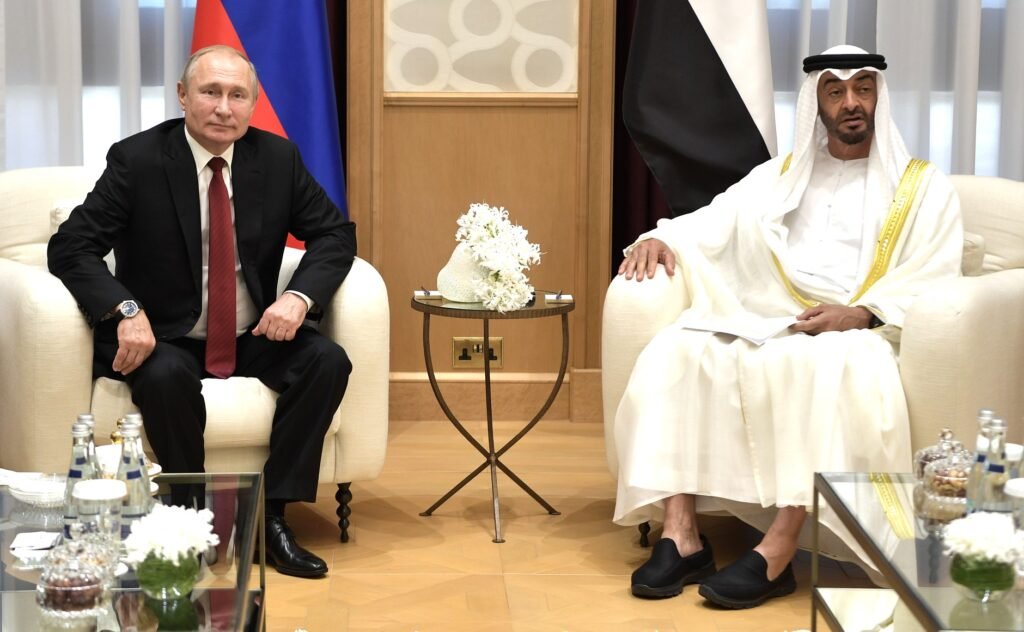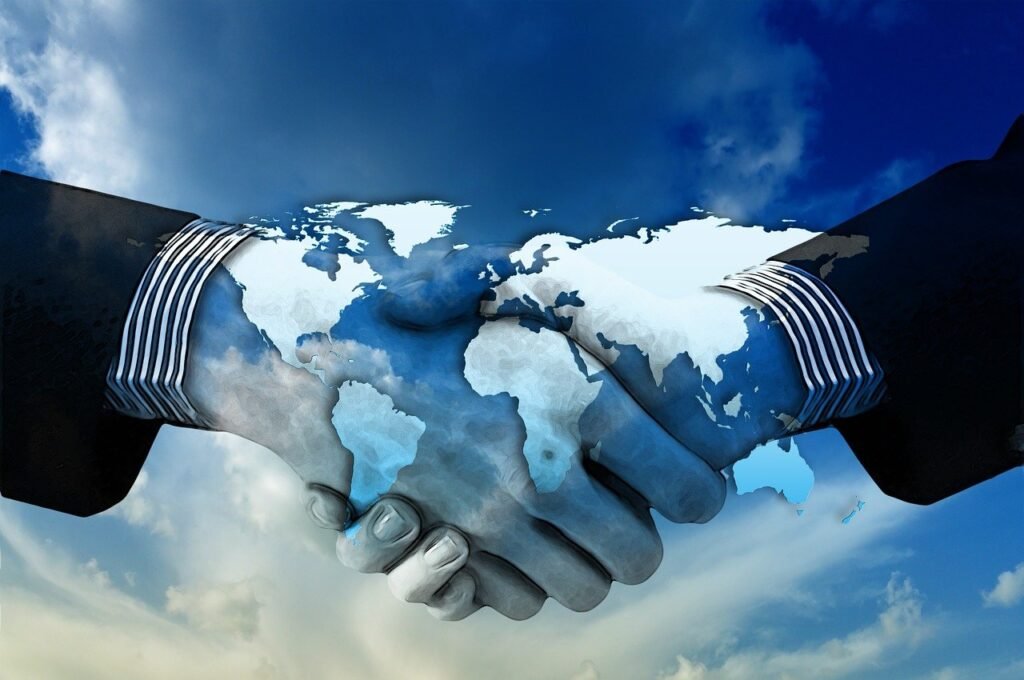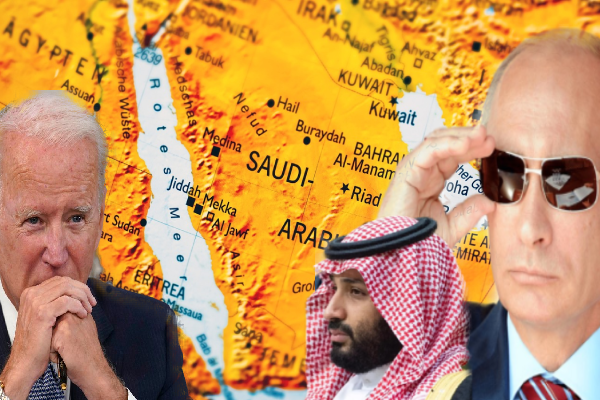On December 6 2023, Russian President Vladimir Putin made a daylong visit to the UAE and Saudi Arabia. In the UAE, Putin was greeted with a grand welcome featuring a 21-gun salute, and the Emirati national air show team skilfully depicted the Russian flag through a smoke trail.
The following day, Putin played host to the President of Iran, Ebrahim Raisi, at the Kremlin. The escalating strategic influence of Russia in the Middle Eastern region raises concerns for the USA, indicating a potential shift in the geopolitical balance away from the USA and Western countries.
In this blog, we will delve into the repercussions of Russia’s deepening involvement with Saudi Arabia, the UAE, and Iran.
Table of Contents
HIGH-LEVEL MEETINGS

Russian President Vladimir Putin commenced his daylong visit in the UAE, where he met with UAE President Mohammed bin Zayed Al Nahyan (MBZ). Both leaders engaged in discussions on enhancing bilateral relations, with Putin expressing to his counterpart, “Our relations, thanks to your stance, have reached an unprecedented level.” The Kremlin emphasized that the UAE holds a pivotal role as Russia’s primary economic partner in the region.
Following his visit to the UAE, Putin proceeded to Saudi Arabia, where he met Crown Prince Mohammed bin Salman (MBS). Putin conveyed to MBS, “Nothing can prevent the development of our friendly relations.” MBS noted that bilateral cooperation has contributed to easing tensions in the Middle East. Discussions between Putin and MBS also included considerations for reducing oil output, aligning such cooperation with the well-being of the global economy.
On December 7, 2023, Iran President Raisi visited Moscow. Raisi underscored the significance of cooperation with Russia in Iran’s neighbourhood policy. Putin stated that the ties between the two nations would become ‘wider and more dynamic’ with the support of Iran’s supreme leader. The leaders delved into the Israel-Hamas war, attributing civilian casualties to Israel’s retaliatory actions following the October 7 Hamas terrorist attack on Israel, which claimed the lives of 1,400 Israeli citizens.
Putin aims to convey a message to the USA and other Western countries that their attempts to isolate Russia are faltering. Meanwhile, countries like Saudi Arabia and the UAE expressed a desire to move away from the sphere of U.S. influence and pursue an independent foreign policy.
VESTED INTERESTS

Geopolitics revolves around interests, as there are no permanent friends and enemies. Western sanctions have adversely affected the Russian economy, leading to the withdrawal of investments and the exit of multinational brands from Russia. The Russian economy heavily relies on oil, with increased exports post the Russia-Ukraine war, especially to countries like India, China, and other friendly nations that purchased discounted Russian oil.
However, the sustainability of the Russian economy solely on oil exports is limited. Recognizing this, Putin intensified engagement with wealthy Middle Eastern countries such as Saudi Arabia and the UAE, to attract Foreign Direct Investment (FDI) and open new markets for Russian products. This strategic approach also influences Russia’s stance in the Israel-Hamas conflict.
Putin commended the ‘Make in India’ initiative and organized a “Russia Calling” summit to attract investment, asserting that economic isolation from the West positions Russia as a new growth centre in a world undergoing radical changes, with the West lagging behind.
In 2022, trade between Russia and the UAE surged by almost 68% compared to 2021, with Russian exports to the UAE reaching $8.5 billion, a 71% increase. Precious stones and gold constituted nearly 40% of Russia’s exports to the UAE. The UAE is viewed as the primary international hub for Russian business, offering a crucial route to bypass Western sanctions.
Trade between Iran and Russia also witnessed a 20% growth, reaching $5 billion over the past year. The two nations expanded cooperation in various sectors, including agriculture, energy, transportation, and infrastructure.
Diplomatic engagement with Russia provides Gulf nations with a platform to diversify geopolitical alliances, reducing dependence on traditional Western partners. This strategic diversification can contribute to a more balanced foreign policy and enhance negotiating positions in regional and international forums. Collaborating with Russia in defence and technology can lead to acquiring advanced military equipment and technological advancements, bolstering the security capabilities of both Saudi Arabia and the UAE, and fostering joint efforts in addressing regional security challenges.
BRICS EXPANSION ADVANTAGE TO RUSSIA
The decision was taken at the BRICS summit in South Africa to add six new permanent members to the alliance. Argentina (which has rejected the offer as the new President took charge in Argentina), Egypt, Ethiopia, Saudi Arabia, the UAE and Iran.
The inclusion of these Middle Eastern countries in BRICS could contribute to a more balanced and multipolar world order, countering the dominance of Western powers. Russia has often advocated for a more inclusive global governance structure, and the incorporation of these key Middle Eastern nations aligns with that vision.
The expansion of BRICS with the inclusion of Saudi Arabia, the UAE, and Iran would challenge U.S. influence in the Middle East, where it has historically maintained strong alliances. This shift could potentially weaken the impact of U.S. policies in the region and limit its ability to shape geopolitical outcomes.
Economically, the enhanced collaboration between the BRICS nations and these Middle Eastern countries might lead to reduced dependence on the U.S. dollar in international trade as BRICS countries are about to launch a new BRICS currency namely ‘R5’, challenging the dollar’s status as the primary global reserve currency. For Russia, it would reduce the impact of Western sanctions. This could weaken the U.S. economy and its ability to leverage economic sanctions for geopolitical purposes.
PUTIN TO CONTEST 2024 ELECTION

Before entering politics, Putin served as a spy for the USSR intelligence agency, the KGB, keeping his personal plans shrouded in secrecy. Recently, a lieutenant colonel in the Russian army directly asked Putin if he would run for the presidency next year, and without hesitation, he affirmed his candidacy. This swift response sends a clear message to the Western world that the Russia-Ukraine war will persist until Russia achieves its goals.
European countries have already strained their resources by supporting Ukraine, and Poland has taken a firm stance by refusing to send additional weapons. Many European nations are grappling with immigration challenges and declining financial prospects. In the United States, Republicans in Congress blocked a $111 billion emergency spending bill, including approximately $50 billion in security assistance for Kyiv.
Putin is strategically navigating the situation, playing a clever game to achieve his objectives.
